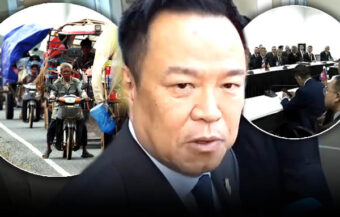Rapid changes, even in the last year, are bringing a quiet revolution to Thailand’s banking and media sectors. Now influential thinkers are suggesting that many existing Thai middle class jobs may be in jeopardy to the new, accelerated movement to an online, digital future. There is also concern about a current labour shortage of skilled technology workers in Thailand which may contribute to stunted future economic growth and wealth creation.
Thailand is in the midst of a quiet revolution, for now focused on the banking and media economic sectors, which could see up to 3 million jobs lost in the next two years. While the Thai government implements an ambitious plan to transform the country’s economy into a technological advanced one, the impact on Thailand’s traditional middle class from a huge economic shift is being felt. The country currently has an acute scarcity of talented technology workers. One influential researcher has predicted that an inability to provide enough labour to this sector could see Thailand’s economic growth stunted to as little as 2% over the coming two decades.

As Thailand battles its way to effect its ambitious Thailand 4.0 economic programme, it may be facing the headwinds of a looming threat from the very sector that the government has identified as the key to economic success. From the 1960s to now, Thailand has been a relatively successful economic player in Southeast Asia with a rising middle class which has seen rapid reductions in the poverty rate. This has been achieved by the creation of a new, urban middle class over five decades of development. However the huge changes and transformation being felt in the modern digital economy now threatens the very heart of that middle class. The country’s banking and media sector is the first to see huge changes which are already underway. Among those that could suffer most may be Thai women who have long flourished in these people support areas and are over represented.
Worldwide shift to online business and the digital economy is a real threat to Thailand’s traditional middle class economic sector
The new economic changes are being driven by the increasing power of the internet and the digital economy. This is an industry that Thai economic leaders have been trying to harness for the benefit of Thailand’s traditional economies, such as tourism, while attempting to create the country’s own digital players under Thailand 4.0. However the new threat is coming from AI or Artificial Intelligence and the increased speed of movement from traditional service offerings to online alternatives. The rise of a younger, more tech savvy consumer market around the world is leading this change. It is a worldwide change that all countries, both in western countries and Asia, are now experiencing at the same time. The speed of change is already contributing to many of the social pressures and alienation being seen in western countries where a more established middle class and particularly older citizens, are finding it difficult to adapt.
Up to 3 million jobs could be lost in the Thai economy in the next two years alone despite growth
In Thailand the threat is more economic. The President of the influential Thailand Development Research Institute, a non profit research foundation operating in Thailand since 1984, Somkiat Tangkitvanich, this week told the Bangkok Post that up to 3 million middle class jobs in Thailand face the chop in the next two years alone as challenges created by the digital economy come to the fore. New smaller firms, harnessing the new technology, with lower staff overheads and companies from outside Thailand, will undercut established players in Thailand. This is not a possibility but a reality that is already underway.
Siam Commercial Bank – Thailand’s oldest bank is leading the Thai banking transformation
One of the key sectors affected is the banking industry. Siam Commercial Bank is one Thailand’s leading banks and perhaps the market leader when it comes to commercial or business lending in Thailand. It is, in fact, Thailand’s oldest bank. The bank is investing heavily in new technology including a popular online banking service. It recently announced that it was eliminating online charges on its online platform to compete with similar services from international players, notably in China. Soon after, many other Thai banks followed its lead. The challenge for the bank industry in Thailand is now, as in western countries, how to manage the movement from person to person transactions to an online based model. The scale of the change is exacerbated by new services and customer engagement experiences being developed through the use of AI or Artificial Intelligence and the speed of change driven by smaller, nimbler and more innovation players. It means an end to the relative security once enjoyed by those employed in the banking sector.
Thailand’s media industry is being challenged and could be torn down and built back up
Not only the banking sector, the media sector, once a highly prized and valued career for those lucky enough get a break, is now facing a blunt confrontation with the hard reality created by AI and online media platforms. Content can be produced at a lower cost and often in a way far more suitable to younger audiences using digitalisation. Throughout the world, traditional media outlets have been left reeling as advertising budgets, normally apportioned to well established media companies and an array of advertising agencies have been diverted, en bloc, to online players such as Google and Facebook. The huge decline in traditional readership and sales for newspapers has long ago given way to competition in every area, from smaller niche players online. In July, Thailand’s state owned broadcaster and media player MCOT, which runs Thailand’s hugely popular Channel 3 TV station, announced a shift to online content as revenues from traditional media sources plummeted. The move has affected many older employees while offering opportunities for new younger Thai employees.
Thailand’s economic growth rate could be stunted to as low as 2% for twenty years
The ability of Thailand’s economic leadership to negotiate these changes will be critical. The country has made great strides in implementing the Thailand 4.0 shift but also faces a massive demographics challenge. The key problem for Thailand is the dearth of young Thai people capable of embracing the new technological future. A key advantage for Thailand is that the change can be implemented faster in a country less developed than its western counterparts with a more dynamic economic model. Ralf Opierzynski is the Head of the Fraunhofer Institute in Bangkok which is a key player in advising international companies on digitalisation and the growth of the new economy. The organisation is based in Munich with a Bangkok regional office serving ASEAN. It advices on the implementation of digitalisation in key industries on a global basis. He has advised the Thai government to invest in the training and upskilling of the Thai workforce. He also emphasised the importance of innovation. Meanwhile the possible expansion of the Thai economy could be stunted over the next few decades if it fails to meet the challenge of digitalisation. This was the opinion of Somkiat Tangkitvanich of the TRDI or Thailand Development Research Institute. He suggests that growth in the economy could be limited to over 2% over the next 20 years if the Thai government fails to come to terms with the issue. This year it is expected to be over 4.5%.
Thailand may have an unexpected advantage over more developed economies – its farming sector and grey economy
The problem for Thailand is that it is still a country emerging from Thailand 2.0, a newly industrialised economy, with many still working in the agricultural sector. It has been reported that 45% of those officially working in the Thai economy are unskilled. Added to this, the fact that as much as 50% of the Thai economy is ‘off the books’ or a grey economy and it is easy to appreciate the challenge. However, this may not be such a negative factor. Thailand’s strong farming sector and grey economy have traditionally allowed the country’s population to weather world storms and crises. It may prove to be a similar boon in the future, giving the Thai government or authorities the economic stability needed to train up younger Thais into the digital world, particularly as the country explores its Thailand 4.0 future with an emphasis on new start ups and innovation. The challenge, as in western countries, is now being faced by traditional middle class areas starting the media and banking sectors.
Move to abolish online fees in July sparked huge push by all Thai banks to an online banking revolution
In the meantime, the country’s banking sector continues to adapt to the new digital world. K Bank, one of Thailand’s leading consumer lenders with a young workforce, is training its staff to work with digital platforms. The bank is rolling out new apps online where, as well as doing day to day banking transactions across a range of banks in Thailand customers will now be able to even open new banks accounts and apply for online loans. The striking move by the banks during the year, lead by Siam Commercial Bank, to eliminate all online fees to consumers has sparked a race for faster implementation and innovation in the Thai online banking sector. This is the future of the industry. It has meant a move to reduce the emphasis on physical branch outlets.
Bank branch closures in Thailand and the huge shift to online banking has been extremely rapid
This year the Government Savings Bank in Thailand announced a partnership with 7/11 stores to offer banking services while it stalled the opening of new bank branches. Other banks have begun to scale bank their branch networks. Siam Commercial Bank is closing up to 125 branches next year alone as it sees a drop off on commercial activity and customer transactions being completed. The bank has reported up to an annual 20% reduction in transactional activity in the last few years. Under its new ‘Going upside down’ policy it will see overall staff number drop by a whopping 12,000 from 27,000 to 15,000 with target of only 400 branches by 2020. Prior to 2017, the number was upwards of 1,200 branch outlets across Thailand. This is a dramatic indication of the change that is being experienced. Sarat Ruttanaporn is the bank’s Vice President and Head of Retail and Branch Network. ‘The branch closures are a result of a change in customer behaviour,’ he told the Bangkok Post. It is not the only change in behaviour and practice. Up to 2,000 Siam Commercial Bank staff members are being trained into roles as financial advisors on investments and wealth management. The bank is focused on its key mission, which is to serve its customer base. Lower overheads and adaptation to the online, digital world is critical to this. Already 53% of all banking transactions are being processed online. This figure is probably higher as this latest data is from the end of September and this was up dramatically from 3 months earlier when it was only 42%.
Social media also a key issue in new Thai work environment and workers must learn to multi task
The new trend is being replicated across Thailand’s financial services industry. The move, as in the media world, is seeing an emphasis on younger staff who can adapt to the digital era. One of the key requirements in this new world is multi tasking. The adoption of AI is being used at a data processing level for now but has yet to be fully implemented in the day to day interaction with the public. Companies worldwide have been experimenting with chatbots and automatic service operating devices but the results have been mixed. In the meantime, the transition period is being marked by the need for workers to be proficient at understanding and adapting flexibly to the online digital world. A key facet is the overlapping world between corporate websites and social media. The management of ‘online channels’ to customers is the game that workers in Thailand’s financial sectors have been adapting to. One upside for the financial industry may be a growth in the overall market as this new approach is more universal where, previously, financial services were regarded as suitable to a more middle class market.
Thailand must compete against other nations in Asia for a share of the new digital economy
Meanwhile new developments in AI will soon herald the way forward for Thailand’s economy and that of the world. The Thai government has been urged to prioritise this shift. Thailand, because it is a dynamic economy supported, ironically, by an agricultural sector and grey economy, capable of absorbing shocks or redundant workers, may have an edge if it can find new young talent to train and develop. It will be joining a race between other Asian players such as China, Japan, South Korea and Singapore for a share of this new world. Thailand 4.0 must adapt to incorporate this. It is the future of the world of business. This is a view shared by Somkiat Tangkitvanich of the Thailand Development Research Institute.
Labour scarcity of digital talent in Thailand
Meanwhile, in the short term at least, Thailand is facing an acute labour scarcity in this area. This is according to Suthida Kanjanakantikul of Manpower, a leading recruitment agency in Thailand with a US parent company. She believes that not only must Thai workers be reskilled and new graduates trained to the digital economy, but that Thai companies themselves must change their operating and staff structures. Thailand has traditionally been a country with a love of hierarchy. This does not work in a fast moving digital world where a more centric model in required. However, she was less radical in her thoughts about AI, at this stage. She emphasised that, even though we are moving to an online world, there is still a demand for people with strong people to people skills. Customers still demand live two way communication. It’s good to know that we are still human after all.
Leading Thai online bank scraps fees to fight off Asian rivals sparking Thai banking revolution


















